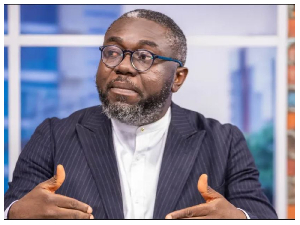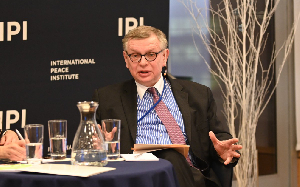Opinions of Wednesday, 7 June 2017
Columnist: John K. Akpalu
Ban on Lawyer for advertising is outmoded and unconstitutional
Most Ghanaians are perplexed by a three-year suspension imposed on Mr. Francis Xavier Sosu, a Ghanaian lawyer, for supposedly advertising his name and number on Facebook.
This, according to the General Legal Council (GLC), is based on 1969 disciplinary rules, specifically Rule 2(4) of the Legal Profession (Professional Conduct & Etiquette Rules) 1969, L.I. 613.
It is highly ironic that the United Kingdom, which we copied the rule from as part of our colonial heritage, has abandoned the total ban on lawyer advertising, as has the United States and other European Union countries.
It is symptomatic of our inability as a country to get on with the times, that we are enforcing a 1969 rule on professional advertising in the age of Facebook and the Internet. My particular pet peeve, in terms of outmoded laws still being applied in Ghana, is the criminal law on attempted suicide. That we still imprison people for attempted suicide in Ghana is a pity. The English, again, from whom we derived this law, have long since abolished it yet which we continue to enforce it with vigour. The Suicide Act (1961) decriminalized attempted suicide in England and Wales.
The blanket ban on lawyer advertising in Ghana is an unconstitutional infringement on free speech as protected by Article 21(1) (a) of the 1992 Constitution. Article 21(1) (a) states that: “All persons shall have the right to freedom of speech and expression…” Speech takes all forms and commercial speech is recognized as one variant of speech and hence protected. It must be noted that freedom of speech is protected in the 1992 Constitution as a fundamental freedom.
Just as pertains in Ghana, Lawyer advertising was banned in the United States until the US Supreme Court found it an unconstitutional infringement on free speech in 1977. The case was Bates v. State Bar of Arizona. Bates advertised his legal services in a newspaper and was brought before the disciplinary committee of the State Bar of Arizona which prohibited lawyer advertising. He was found guilty and subject to suspension from practice and he sued the bar association. The US Supreme Court derided the advertising ban as an anachronism meant to “perpetuate the market position of established lawyers.” The Court also found that the ban served to “inhibit the free flow of information and keep the public in ignorance.”
The decision in Bates v. State Bar of Arizona, and that of Virginia State of Pharmacy Board v. Virginia Citizens Consumer Council (1976) which upheld the constitutional right of pharmacists to advertise the price of prescription drugs, opened the way to advertisement by professionals in the United States.
The General Legal Council can impose reasonable limits on lawyer advertising and in almost all jurisdictions that allow lawyers to advertise, the ban is only limited to “false, deceptive or misleading advertisement.”
Many European Countries previously prohibited their lawyers from advertising. However, the adoption of The Code of Conduct for Lawyers in the European Union (CCBE Code) and decisions by the European Court of Justice made them rescind the prohibition and permit lawyer advertising. The Bar of England and Wales revoked their ban on lawyer advertising in its March 31, 1990 Code.
This was before the enactment of the Court & Legal Services Act of 1990. So also, The UK Solicitors Publicity Code only prohibits “misleading or inaccurate advertising.” The Code of Advertising and Publicity of the Code of Conduct of the Bar of England & Wales (2002 Amendment) also permits lawyer advertisement except for inaccurate or misleading advertisements; advertisements likely to bring the profession into disrepute; advertisements which make direct comparison or criticism of other barristers or members of other professions; advertisement which include statements about the barrister’s success rate; or advertisements which are so obtrusive as to cause annoyance to those to whom it is directed.
Scotland also allows Solicitors and Barristers to advertise and Northern Ireland allows Solicitors to advertise. In France, the Bar of Paris, which is the largest bar association allows advertising by lawyers. It provides that: “personal advertising aimed at providing the public with needed information is lawful. It shall be implemented with dignity, thoughtfulness, probity and discretion; it shall be accurate and respectful of the professional obligation of confidentiality.”
The General Legal Council ought to revise or lead a revision of its disciplinary rules on lawyer advertisement to accord with the free speech provisions of the 1992 Constitution and to conform to modern trends in Europe and the United States.
In the interim, I will encourage Mr. Sosu to sue to vindicate his constitutionally protected right to free speech.
John K. Akpalu, Esq. LL.M. (Harvard).
The writer is an admitted lawyer in Ghana and New York.














